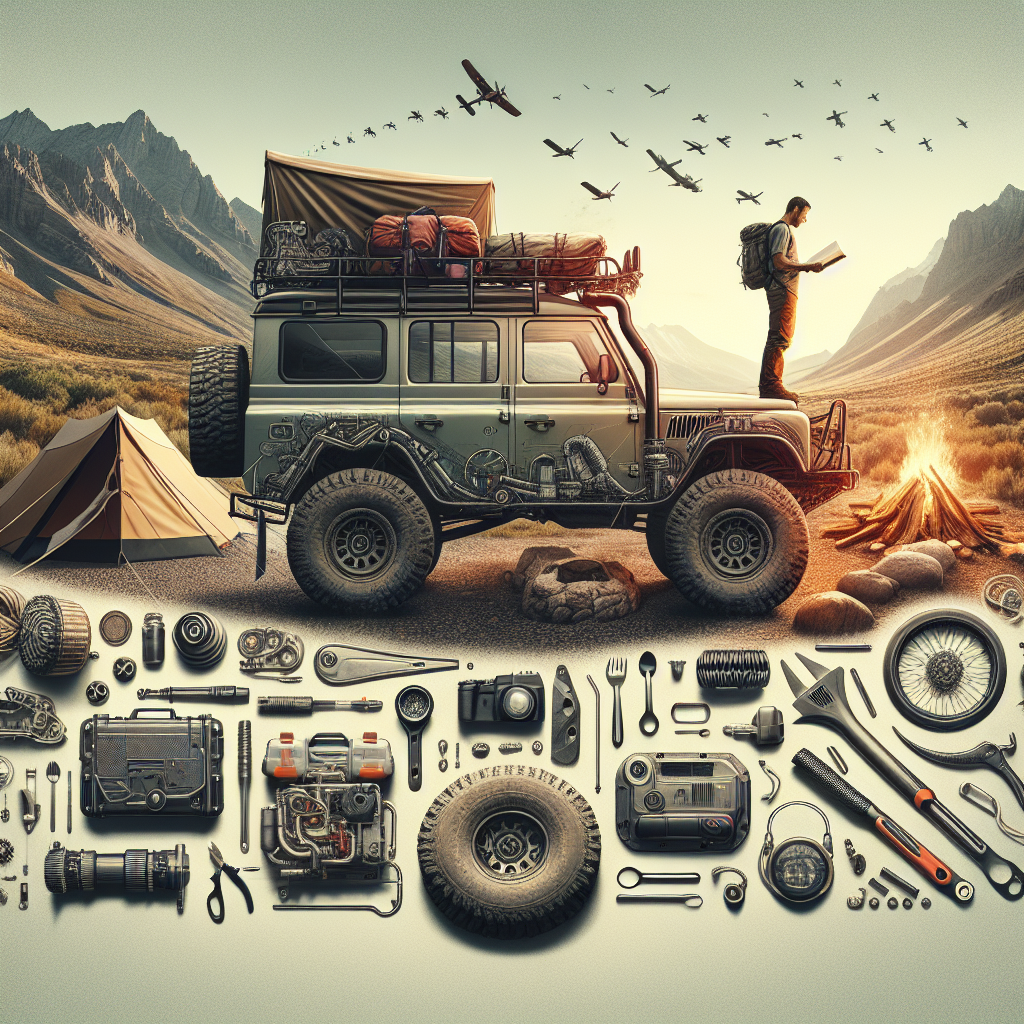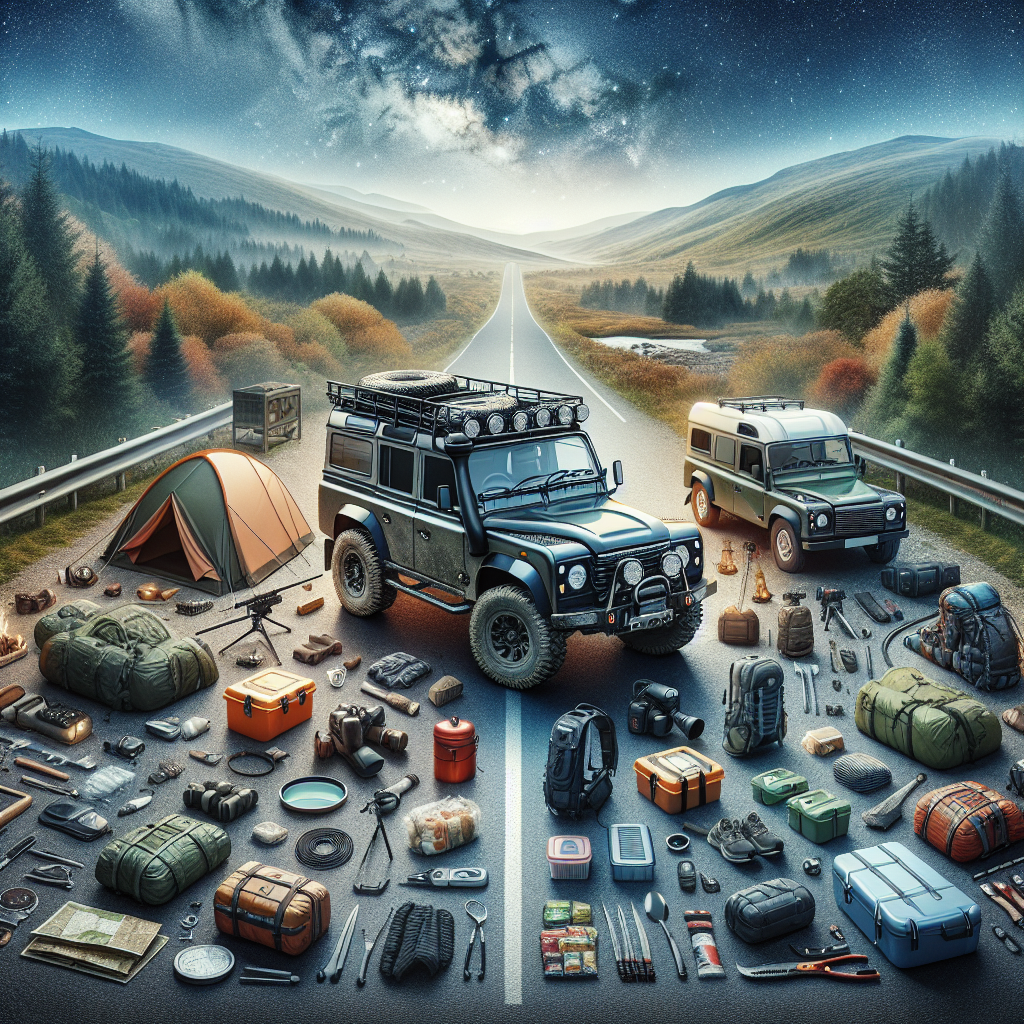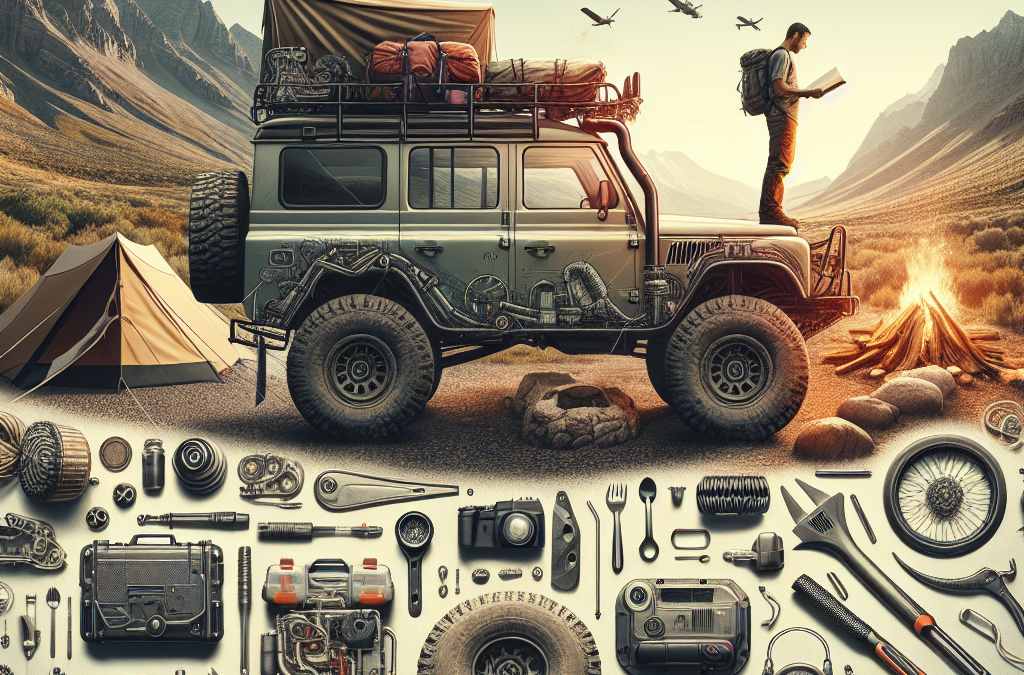Imagine embarking on a journey where the open road beckons and nature calls your name. “Overlanding: Vehicle-Based Adventure Camping” is the article that will guide you through this thrilling way of travel and outdoor living. Overlanding is not your classic camping trip; no, it is about the journey as much as the destination, in which your vehicle becomes your home away from home. Prepare to unlock an adventure that revolves around self-reliance, exploration, and experiencing the world around you from a whole new perspective. With your vehicle as your loyal companion, explore the ins and outs of leveraging it for adventure camping and get a taste of the spontaneity and freedom inherent in the overlanding lifestyle. So, strap in, spark your wanderlust, and let’s take this exciting road together.
Understanding Overlanding
Overlanding is an adventurous way of traveling to remote locations where the journey is the main goal. It’s about exploration rather than conquering obstacles. While many overlanding trips are off-road adventures, the main purpose is not just tackling challenging terrains but to also enjoy and experience the culture, scenery and often the remote areas which few have traveled.
Definition of Overlanding
Overlanding is all about travel for the sheer pleasure of the journey. It involves long-distance exploration, often in a four-wheel-drive vehicle, where the process of travel is more important than the destination. Overlanding can take you across deserts, through jungles, over mountains, and along coasts. It is a self-reliant journey, where you’re expected to be able to survive on your own for several days or even weeks at a time, as you may pass through entirely uninhabited areas.
Brief History of Overlanding
The concept of overlanding originated in Australia in the mid-19th century. It was historically referred to the driving of livestock over long distances across the outback. The term has since been adapted to refer to vehicle-based exploration. Overlanding gained popularity during the 20th century as vehicles became more efficient and reliable, and passionate travelers began seeking more adventurous ways to explore the world around them.
Overlanding vs. Traditional Camping
While overlanding and traditional camping share some similarities such as being outdoors and sleeping in tents, overlanding primarily focuses on the journey. Traditional camping usually involves picking a destination, reaching there, setting up camp and exploring nearby. However, overlanding is nomadic in nature. Overlanders move from place to place, often setting up a new camp each night.
Essential Overlanding Equipment
Being prepared is key to a successful overlanding journey. Here’s a list of essential overlanding equipment.
Choose Your Vehicle: 4WD Vs. 2WD
Choosing the right vehicle is one of the most critical aspects of overlanding. Generally, a four-wheel drive (4WD) vehicle is recommended because they offer better traction on difficult terrains. However, 2WD vehicles can also be used for overlanding on less challenging trails. Ultimately, the best vehicle for overlanding is one that fits your particular journey and comfort level.
Rooftop Tents and Ground Tents
Overlanders can choose between ground tents and rooftop tents. Ground tents are versatile but can be a hassle to set up and take down. Rooftop tents attach to the roof rack of your vehicle, which keeps you elevated from the ground and is often more comfortable and faster to set up than ground tents.
Kitchen Setup for Overlanding
Cooking is a big part of the overlanding experience. Many overlanders opt for a portable kitchen setup that includes a gas or charcoal grill, a cooler or refrigerator, a water storage system, and utility boxes for storing food and cooking utensils.
Navigational Equipment Needed
Today, GPS units, smartphones with offline maps, and traditional compasses and topographic maps are all valuable navigation tools that an overlander should possess.

Setting Up Your Overlanding Vehicle
Finding the Right Vehicle Type
Your vehicle choice will significantly influence your overlanding experience. Four-wheel-drive vehicles are the most popular due to their off-road capabilities. Common choices include (but are not limited to) Jeeps, Land Rovers, trucks and SUVs. Your choice should take into consideration not just the terrain you’ll be traveling on, but also the amount of storage space you need and the number of people you’ll be traveling with.
Essential Vehicle Modifications
To enhance the vehicle’s functionality and reliability in rough terrains, some modifications may be necessary. These might include adding a suspension lift for more ground clearance, adapting tires for off-road use, installing a roof rack for extra storage or a rooftop tent, and perhaps reinforcing the vehicle’s underbody to protect against rocks and other hazards.
Interiors: Storage and Sleeping Arrangements
Intelligent interior design can significantly enhance your overlanding experience. Designated storage areas for food, cooking equipment, clothing, and other essential items can help ensure everything has a place and is easy to find. The sleeping arrangement can also affect the trip’s comfort level, with some opting for rooftop tents, others for back-of-the-car mattresses, and others for pulled-behind trailers.
How to Handle Maintenance and Repairs on the Road
Handling vehicle repairs on the road is an invaluable skill for any overlander. Having a basic understanding of your vehicle’s mechanics and carrying a tool kit, spare parts, and an air compressor for tire repairs is highly recommended.
Essential Skills for Overlanding
Off-road Driving Skills
Knowing how to handle your vehicle over various terrains is a must in overlanding. This can mean anything from maneuvering through muddy patches to climbing steep hills or navigating through sand.
Basic Mechanical Knowledge
Having a good understanding of your vehicle and how it works can be extremely beneficial. Understanding troubleshooting problems like diagnosing why your vehicle won’t start or how to repair a flat tire are important skills.
Navigation and Map Reading Skills
While technology can usually get us where we want to go, having traditional navigation skills is crucial when in remote areas. Understanding how to read a topographic map, use a compass, and navigate using landmarks are all critical skills in overlanding.
Survival Skills and First Aid
Having basic survival skills and knowledge of first aid is crucial. From knowing how to start a fire and finding water to dealing with basic wounds or injuries, these skills can help keep you safe and comfortable.

Safety Concerns and Solutions While Overlanding
Overlanding can pose unique safety issues compared to conventional travel. It’s important to be prepared and know potential challenges.
Gear Security and Theft Prevention
When traveling with all your gear, keep items secure when left unattended at camping sites or while exploring nearby sites. This may mean storing valuables in locked areas of your vehicle and being conscious of where and how you store your gear.
Wildlife Awareness and Protection
You might encounter various wildlife species depending on where your journey takes you. Always maintain a safe distance and never feed wild animals. Research ahead of time to understand any specific wildlife you may encounter in your journey.
How to Handle Remote Medical Emergencies
Having a well-stocked first aid kit is a must. In addition to this, knowing how to use the items in your medical kit to treat injuries or illnesses can be lifesaving in a remote medical emergency.
Communications in Isolated Areas
Effective communication is important, especially in isolated areas. Always keep someone informed of your plans. Satellite phones or GPS messenger devices can be beneficial for keeping in contact when mobile service isn’t available.
Planning Your Overlanding Trip
Planning your overlanding trip is key to ensure your journey is enjoyable and safe.
Selecting Your Route and Destination
When selecting your route and destination, consider the type of terrain you will encounter and make sure your vehicle and gear are equipped to handle it. Also, consider how long you will be gone and how isolated you will be.
Researching Local Laws and Regulations
Many places have specific rules and regulations regarding where and when you can camp, what kind of activities you can engage in, and even where you can drive. Always familiarize yourself with these rules before you set out.
Food Prep and Water Storage
When it comes to food and water, planning is critical. Be sure to pack enough food and water for the duration of your trip, considering not just meals but also snacks and emergency rations.
Weather and Terrain Considerations
Weather can be unpredictable, and different terrains may call for different equipment or measures. Always ensure you have suitable gear for the climate and terrain of your destination.
Environmental Considerations and Ethics
Respecting the environment is a fundamental aspect of overlanding.
Leave No Trace Principles
These principles promote responsible outdoor behavior where visitors strive to minimize their impact on the environment.
Wildlife Interaction Guidelines
Wildlife should always be observed from a distance, and feeding wildlife is usually illegal and damaging to their health.
Off-Road Driving Impact
Off-roading can lead to soil erosion, damage to local vegetation, and disturbances to wildlife. Driving over established tracks and minimizing your off-track travel can help to reduce these impacts.
Maintaining Clean Campsites
Picking up after yourself, not leaving any trash or food waste behind, and cleaning up your campsite before you leave are all part of maintaining a clean environment.
Overlanding Community and Resources
If you delve into overlanding, you’ll find a vibrant and supportive community waiting to assist you on your journeys.
Joining Overlanding Groups and Organisations
Joining overlanding groups and organisations can be a great way to connect with others who are also passionate about overlanding. They offer a place to share experiences, gain knowledge and often they host group trips.
Benefits of Joining Overlanding Communities
Besides forming relationships with other like-minded individuals, these communities often provide educational resources, trip planning tools, and possibly even discounts on gear or services.
Online Resources and Forums
There are numerous online resources and forums where overlanders share their experiences and provide advice and tips to newcomers.
Overlanding Events and Festivals
These events provide a unique opportunity to meet fellow overlanders, learn from their experiences, and discover the latest gear and trends in the industry.
Overcoming Common Overlanding Challenges
Despite being a rewarding experience, overlanding also comes with its fair share of challenges.
Dealing with Vehicle Breakdowns
Your vehicle is going to be working hard, and that means things can break. Having spare parts handy and knowing basic repairs can turn a potentially catastrophic breakdown into a simple delay.
Handling Unexpected Weather Changes
Weather can change rapidly, especially in mountainous regions. Overlanders must be prepared to deal with sudden weather shifts, which includes having appropriate clothing and vehicle equipment.
Overcoming Loneliness and Boredom
Overlanding trips can sometimes be isolating. Having a variety of activities to fulfill your time is one way to overcome this. Books, music, photography, and games are just a few examples.
Managing Waste and Hygiene
Without fixed facilities, waste and hygiene management can be a challenge. Always carry a portable toilet, shower, and trash bags to help manage these necessities while on the road.
Tips and Tricks from Experienced Overlanders
Experienced overlanders often have a wide range of tips and tricks to make the process smoother and more enjoyable.
Packing Tips for Maximizing Space
The organization is key when packing for an overland trip. Utilize all the spaces in your vehicle, including under seats and in the glove box. Furthermore, using containers can help compartmentalize your items making them easier to find.
Cooking and Meal Prep Tactics
Cooking on the road requires some planning and preparation. Simple, nutritious meals that can be made on a single burner stove are perfect for overlanding. Meal prepping prior to departure can also be a huge time saver.
Efficient Fuel Usage
Fuel management can be challenging on long journeys where fuel stations are few and far between. Carrying extra fuel and knowing the range of your vehicle can prevent you from being stranded.
Bonus Camping Hacks for Comfort and Convenience
Experience brings knowledge. From using solar lights and portable chargers to selecting the right campsite, there are countless camping hacks that can help increase your comfort and convenience while on an overlanding adventure. The more you explore, the more you’ll learn and develop your own set of tips and tricks. Happy overlanding!

